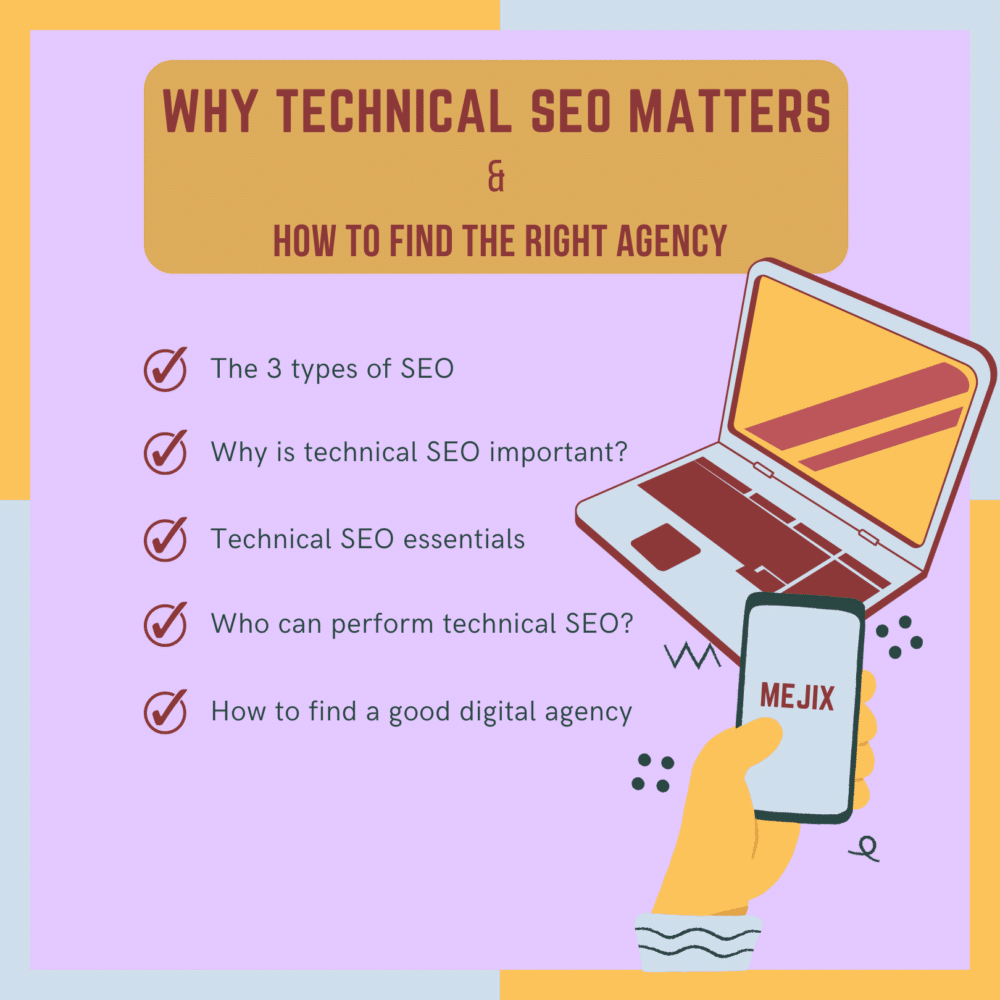Why Technical SEO Services Matter and How to Find the Right Agency
It’s absolute: technical SEO services make all the difference in today’s eCommerce world. But how do you find a reliable technical SEO agency?

Let’s kick off this debate with a good-natured joke. Ready? There are two types of answers to the question of what technical SEO is: “wait, isn’t all SEO technical?” and “hold on, SEO is technical?!” This silly little jest captures a grain of truth: most people don’t quite know what to make of this broad and widely rumored discipline.
The reason behind that? There’s too much of everything being thrown around about Search Engine Optimization. Some believe that anyone can take a few basic website optimization measures with a bit of research, practice, and effort—that is, indeed, true. However, only trained professionals (with web development skills up their sleeves) can execute the more technical aspects of SEO, particularly when it comes to code, security, and server-level optimizations.
Therefore, at some point in the digital existence of your business, you begin to wonder: where should I look for technical SEO services? And is there even such a thing as a specialized SEO agency?
Before we answer these questions, let’s briefly talk about the main types of SEO. After all, it’s always good to know what you’re looking for before you start looking for it.
The three types of SEO
With SEO, we can easily trace out three main intertwined categories:
- Firstly, on-page SEO focuses on your internal website structure, its functionality, and the quality of its content. If you’d like to know more about it, check out our previous blog!
- Secondly, off-page SEO focuses on how authoritative and popular your website is compared to other web platforms in the same market segment. We also have an entire blog on off-page SEO, so check it out for some pretty nice insights.
- Thirdly, technical SEO is the process of ensuring that a website is up-to-date and meets all of the technical requirements of modern search engines. In short, it aims to improve specialized aspects like crawling, indexing, and website architecture.
Correctly performed, these SEO practices ultimately contribute to better search rankings and a spike in organic website traffic.
Why is technical SEO important?
With SEO, all three types matter just as much. Regardless of the sub-type, the ultimate goal of SEO is to create a user-friendly, client-tailored, content-rich, and easily indexable website. Since search engines like Google always try to return the best possible results to user search queries, your website has to be ready to deliver on all fronts.
Now, technical SEO in particular tries to improve crawling, indexing, rendering, and website architecture, which significantly contribute to search rankings & organic traffic. Search engine bots, known as “crawlers,” evaluate web pages on many factors. And many of these factors are highly technical (for instance, how fast webpages load). So by not paying attention to these factors, you run the risk of ranking low & losing valuable web traffic.
Technical SEO Essentials
Technical SEO practices aim to make a website optimal, safe, and well-designed for both human users and search engines (primarily Google). Before we discuss how to find excellent technical SEO services, let’s wrap our heads around the types of things a specialized SEO agency should be able to deliver.
CORE TECHNICAL SEO: WEBSITE STRUCTURE
Before anything else, technical SEO services should look at the core structure or architecture of a website. This includes how written and visual information is organized, the number of landing pages on a website, and how they’ve been linked to one another (the internal linking structure).
A website’s base structure also comprises the following: website categorization, simple and clear URL structures, sitemaps, and proper robots.txt file usage. All of these aspects play a significant role in how search engines index your website.
TECHNICAL SEO: CORE CRAWLING & INDEXING FACTORS
1. ROBOT.TXT
Should start by checking your robots.txt file, which is the point of reference for any web-crawling engine. Long story short, the robots.txt file teaches search engine crawlers which URLs they should access (or crawl) on your site and which URLs they should avoid. URLs that you should generally disallow in your robots.txt file are admin pages, temporary files, cart or checkout pages, search-related pages, and others—depending on the website’s structure and content.
As you might have guessed by now, these are aspects that web developers and SEO consultants can advise you on. Properly using the robots.txt file has some undeniable perks: you save server resources, bandwidth, avoid overloading your site with requests, and make clever use of your “crawl budget,” since only a limited number of pages can be included in a crawl and thus indexed.
Finally, make sure to include the location of your XML sitemap(s) in the robots.txt file.
2. XML Sitemaps
An XML sitemap is a file that lists the most important pages on a website. A good sitemap ensures that web crawlers can easily find your pages and understand your overall website structure without too much hassle. It’s also constructive for listing pages that lack internal links pointing to them and would be difficult to discover and index otherwise. In short, XML sitemaps instruct engines on your site structure and what they should index.
A good XML sitemap should be regularly updated with the new content you add to your website (like new blogs) and only 200-status URLs (pages that can be successfully accessed). By contrast, it should exclude 301 redirects, no-index tags, 4xx or 5xx status code URLs, and duplicate content.
OTHER TECHNICAL SEO REQUIREMENTS
1. WEBSITE SECURITY
Lastly, you’ll need a technical team to regularly perform website security checks. In general, running performance checks and using analytics and SEO-tailored tools will help web developers and SEO specialists make structured, regular improvements to all of the abovementioned aspects.
2. CODE QUALITY
Naturally, SEO also relies on efficient website code. Therefore, technical teams have to ensure that no superfluous functions or idle code sections are present.
3. LOADING SPEEDS
A technical SEO strategy should maximize your website’s loading speeds, also known as server response times.
4. MOBILE OPTIMIZATION
Nowadays, ensuring that a website is fully optimized for mobile device usage is crucial for search engine rankings, primarily due to the growing number of users who use their smartphone devices to access and browse the web.
WHO CAN PERFORM TECHNICAL SEO?
If we stop to think about the vast technical expertise needed to devise a proper SEO strategy, we’ll quickly realize that technical SEO is best performed in a cross-functional team by a web developer or SEO specialist. In fact, a truly successful optimization strategy emerges out of the continuous collaboration between several specialized parties: SEO specialists, content strategists, UX designers, web developers, and marketing consultants.
HOW TO FIND A GOOD TECHNICAL SEO AGENCY?
Usually, a web development agency specializing in SEO will generally deliver the best technical SEO services at cost-effective prices. So now, what should you look for when starting a conversation with such an agency?
First, be sure the agency has in-house professionals ready to deliver value in all of the areas we have mentioned so far: SEO specialists, web developers, UX designers, content writers, and so forth. Secondly, ensure that it has developers specialized in the eCommerce platform your website is built upon. For more about eCommerce vendors, check out this blog. Finally, do take a look at our 2021 guide on choosing a great web agency.
OUR TECHNICAL SEO SERVICES
Are you for some great news?
If you need a helping hand to figure out exactly how much technical SEO work needs to be done on your website, reach out to us today to request a free technical SEO audit. We’ll get back to you with a full report on how your website performs in terms of SEO before you hire a technical SEO consultant or agency!












